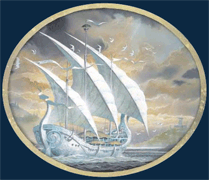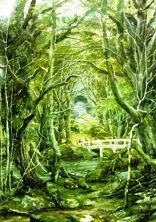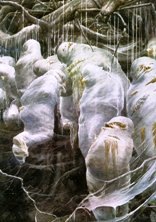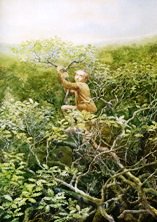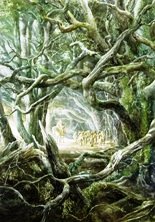Tolkien Calendar: The Hobbit
August 24: TA 2941
24 August 2008 14:07:35Categories: Hobbit Calendar
At dusk the dwarves are captured by wood elves & taken to the Elvenking's halls.
Demoralised by Thorin's capture, and exhausted after escaping from the spiders, Bilbo & the dwarves desperately search for a way out of Mirkwood. The dwarves are in no state to offer any resistance to the wood-elves, but Bilbo is quick-witted enough to slip on the ring, and make his way invisibly to the Elvenking's halls in the wake of the wood-elves and their prisoners.
The Elvenking is an interesting figure: guardian of Mirkwood, he sits " . . . on a chair of carven wood. On his head was a crown of berries and red leaves, for the Autumn was come again. In the Spring he wore a crown of woodland flowers. In his hand he held a carven staff of oak."
Tolkien's description brings to mind the Green Man, who traditionally represented nature and the cycle of the seasons. The oak tree is King of the Greenwood and symbolises the power of the High King and his ancient and spiritual link to the land. In pagan tradition the Oak King fights with the Holly King at the Summer and Winter solstice to bring about the changing of the seasons. Tolkien would have been familiar with these mythologies, as they underlie the poem Sir Gawain and the Green Knight, which Tolkien co-edited with E V Gordon during the early 1920s.
The treatment the dwarves receive at the hands of the wood-elves is in contrast to the way they are dealt with by the goblins in Chapter IV. Then, they were led off in chains and left to rot; here the King orders them to be untied while he questions them. Angered by their trespassing - which has roused the spiders - and their refusal to reveal their mission, he has them locked up until one of them changes his mind, but they will be treated decently in the meantime. Are the dwarves right to defy the Elvenking or are they merely being stubborn and greedy?
Bilbo spends many, many days in hiding, venturing into the woods from time to time but never daring to go too far and unwilling to desert his imprisoned companions:
"I am like a burglar that can't get away, but must go on miserably burgling the same house day after day," he thought. "This is the dreariest & dullest part of all this wretched, tiresome, uncomfortable adventure" . . . he often wished, too, that he could get a message for help sent to the wizard, but that of course was impossible, and he soon realised that if anything was to be done, it would have to be done by Mr Baggins, alone and unaided."
Although Bilbo finds this wait frustrating, it is a character building exercise. Until now he has relied on his sword and quick wits to see him through, making snap decisions. Forced to be patient, Bilbo shows himself to be determined and resourceful, working out where each dwarf is held, eventually discovering Thorin's cell "in an especially deep, dark place" and becoming a means of communication between them all.
Thorin takes new heart at this; he and the other dwarves now rely on Bilbo to get them out of their predicament:
" . . . . they all trusted Bilbo. Just what Gandalf had said would happen, you see. Perhaps that was part of his reason for going off and leaving them,"
Bilbo finds the dwarves' dependence on him a burden, but it is the making of him. By biding his time he eventually finds a means by which they can all escape . . .
The Elvenking is an interesting figure: guardian of Mirkwood, he sits " . . . on a chair of carven wood. On his head was a crown of berries and red leaves, for the Autumn was come again. In the Spring he wore a crown of woodland flowers. In his hand he held a carven staff of oak."
Tolkien's description brings to mind the Green Man, who traditionally represented nature and the cycle of the seasons. The oak tree is King of the Greenwood and symbolises the power of the High King and his ancient and spiritual link to the land. In pagan tradition the Oak King fights with the Holly King at the Summer and Winter solstice to bring about the changing of the seasons. Tolkien would have been familiar with these mythologies, as they underlie the poem Sir Gawain and the Green Knight, which Tolkien co-edited with E V Gordon during the early 1920s.
The treatment the dwarves receive at the hands of the wood-elves is in contrast to the way they are dealt with by the goblins in Chapter IV. Then, they were led off in chains and left to rot; here the King orders them to be untied while he questions them. Angered by their trespassing - which has roused the spiders - and their refusal to reveal their mission, he has them locked up until one of them changes his mind, but they will be treated decently in the meantime. Are the dwarves right to defy the Elvenking or are they merely being stubborn and greedy?
Bilbo spends many, many days in hiding, venturing into the woods from time to time but never daring to go too far and unwilling to desert his imprisoned companions:
"I am like a burglar that can't get away, but must go on miserably burgling the same house day after day," he thought. "This is the dreariest & dullest part of all this wretched, tiresome, uncomfortable adventure" . . . he often wished, too, that he could get a message for help sent to the wizard, but that of course was impossible, and he soon realised that if anything was to be done, it would have to be done by Mr Baggins, alone and unaided."
Although Bilbo finds this wait frustrating, it is a character building exercise. Until now he has relied on his sword and quick wits to see him through, making snap decisions. Forced to be patient, Bilbo shows himself to be determined and resourceful, working out where each dwarf is held, eventually discovering Thorin's cell "in an especially deep, dark place" and becoming a means of communication between them all.
Thorin takes new heart at this; he and the other dwarves now rely on Bilbo to get them out of their predicament:
" . . . . they all trusted Bilbo. Just what Gandalf had said would happen, you see. Perhaps that was part of his reason for going off and leaving them,"
Bilbo finds the dwarves' dependence on him a burden, but it is the making of him. By biding his time he eventually finds a means by which they can all escape . . .
© middle-earth-journeys.com. Images © Alan Lee.
August 23: TA 2941
23 August 2008 08:38:12Categories: Hobbit Calendar
Before dawn Thorin is captured by the Wood-elves, and the other Dwarves by giant spiders. Bilbo rescues the Dwarves.
When Bilbo awakens, he finds he is caught in the trap of a giant spider, who is creeping toward him. Without a thought, he uses his sword to free himself and kill the spider. This victory leads Bilbo to name his sword "Sting".
When Bilbo goes to find the dwarves, he finds that they have been captured by the spiders too. Bilbo distracts the spiders by throwing stones at them and leads the spiders away from the dwarves by yelling. Bilbo is wearing his ring the whole time, so the spiders can't find him. Bilbo quietly returns to the dwarves and frees them, but the spiders return and the company begins to fight them off. After the spiders suddenly retreat, the company realizes they are in one of the areas used by the elves. They rest for a moment, trying to decide what to do next, when they realize that Thorin is missing.
They do not know that he was taken by the Elves.
This event marks the beginning of a new brave and courageous Bilbo. He doesn't think twice about freeing himself, slaying the spider, and saving the dwarves. His actions save the lives of the dwarves, again. This time, it was not by luck, but by bravery.
When Bilbo first finds the ring, it's magic helps him to escape the mountain. The dwarves look on him with a new confidence. But, this act was different. Bilbo did not rely on the magic to impress the dwarves, he actually stepped up and used his courage. He only used the ring to trick the spiders, when he knew he was unable to slay them all.
I think this is a milestone for Bilbo. He finally realizes what he's capable of. He uses his abilities and the tools that are around him to make quick decisions. This is very different from the forgetful, afraid Bilbo at the beginning of the story.
When Bilbo goes to find the dwarves, he finds that they have been captured by the spiders too. Bilbo distracts the spiders by throwing stones at them and leads the spiders away from the dwarves by yelling. Bilbo is wearing his ring the whole time, so the spiders can't find him. Bilbo quietly returns to the dwarves and frees them, but the spiders return and the company begins to fight them off. After the spiders suddenly retreat, the company realizes they are in one of the areas used by the elves. They rest for a moment, trying to decide what to do next, when they realize that Thorin is missing.
They do not know that he was taken by the Elves.
This event marks the beginning of a new brave and courageous Bilbo. He doesn't think twice about freeing himself, slaying the spider, and saving the dwarves. His actions save the lives of the dwarves, again. This time, it was not by luck, but by bravery.
When Bilbo first finds the ring, it's magic helps him to escape the mountain. The dwarves look on him with a new confidence. But, this act was different. Bilbo did not rely on the magic to impress the dwarves, he actually stepped up and used his courage. He only used the ring to trick the spiders, when he knew he was unable to slay them all.
I think this is a milestone for Bilbo. He finally realizes what he's capable of. He uses his abilities and the tools that are around him to make quick decisions. This is very different from the forgetful, afraid Bilbo at the beginning of the story.
© middle-earth-journeys.com. Images © Alan Lee.
August 22: TA 2941
22 August 2008 11:35:46Categories: Hobbit Calendar
They leave the path at night.
The four days after the Dwarves and Bilbo encounter the Wild Hunt and the enchanted stream are dismal indeed--little food or water, the endless dark and dank of Mirkwood, and the labor of carrying the sleeping Bombur. Add to that the eerie distant singing and laughter that they hear sometimes, which can only come from Elves, beings none of the party truly understand or trust.
Some hope is kindled when Bilbo climbs a tree to see if the "accursed forest" is nearing its boundary, but he sees only treetops and butterflies because the tree he is in grows in a valley. He and the disappointed Dwarves do not realize how near to the end they are; indeed they are very close to if not inside the borders of the Elven Kingdom of Thranduil, father of Legolas and one of the few golden-haired Elves in Middle Earth not of Galadriel's line.
On the fourth night out from the stream, the company finishes the last of the food and water, and the joyless morning brings only hunger, thirst, rain, and hopelessness. Only Bombur's waking provides an unexpected bright spot, and even this is blighted by his constant complaining and descriptions of the feast he was having in his dreams.
On the night of this fifth day, Bilbo and the Dwarves begin to see lights and to hear laughter and voices in the forest: Thranduil's Elves at their feast. Chasing the lights, the smell of food, and the sound of cheerful voices leads the group off the path into hopeless confusion. They are soon completely lost, as they were told they would be if they strayed from the path. Once again Bilbo is left behind in the melee,alone in the silence and darkness, and miserable. He does not realize he is on the brink of discovering his own particular greatness on this adventure.
As we have seen before, all the element of faerie are still here, with a special emphasis on the old injunction not to leave the appointed path or something bad will happen to you. But Dwarves never really listen, do they?
It has always intrigued me that the Mirkwood Elves are so different from those in LOTR and the Sil, and never more so than here where their teasing and somewhat malicious magic has far more in common with all the old tales of folkloric Elves than with Legolas and Galadriel. . . .What is the true nature of Elven magic in Tolkien's world, after all? And are the Elves in The Hobbit so different because it was originally a children's story only tangentially connected to the rest of the legendarium, and he chose not to substantially change their character when he linked the works later?
Some hope is kindled when Bilbo climbs a tree to see if the "accursed forest" is nearing its boundary, but he sees only treetops and butterflies because the tree he is in grows in a valley. He and the disappointed Dwarves do not realize how near to the end they are; indeed they are very close to if not inside the borders of the Elven Kingdom of Thranduil, father of Legolas and one of the few golden-haired Elves in Middle Earth not of Galadriel's line.
On the fourth night out from the stream, the company finishes the last of the food and water, and the joyless morning brings only hunger, thirst, rain, and hopelessness. Only Bombur's waking provides an unexpected bright spot, and even this is blighted by his constant complaining and descriptions of the feast he was having in his dreams.
On the night of this fifth day, Bilbo and the Dwarves begin to see lights and to hear laughter and voices in the forest: Thranduil's Elves at their feast. Chasing the lights, the smell of food, and the sound of cheerful voices leads the group off the path into hopeless confusion. They are soon completely lost, as they were told they would be if they strayed from the path. Once again Bilbo is left behind in the melee,alone in the silence and darkness, and miserable. He does not realize he is on the brink of discovering his own particular greatness on this adventure.
As we have seen before, all the element of faerie are still here, with a special emphasis on the old injunction not to leave the appointed path or something bad will happen to you. But Dwarves never really listen, do they?
It has always intrigued me that the Mirkwood Elves are so different from those in LOTR and the Sil, and never more so than here where their teasing and somewhat malicious magic has far more in common with all the old tales of folkloric Elves than with Legolas and Galadriel. . . .What is the true nature of Elven magic in Tolkien's world, after all? And are the Elves in The Hobbit so different because it was originally a children's story only tangentially connected to the rest of the legendarium, and he chose not to substantially change their character when he linked the works later?
© middle-earth-journeys.com. Images © Alan Lee.
August 16: TA 2941
16 August 2008 13:46:02Categories: Hobbit Calendar
The Company crosses the Enchanted Stream. Bomber falls into a trance.
Gandalf has gone and the company has been left to cross Mirkwood without him, with the instruction 'DON'T LEAVE THE PATH' ringing in their ears. Mirkwood - the very name tells you everything you need to know about it: pitch black nights, stuffy and airless, alarmingly thick cobwebs, scuffling sounds and bulbous insect eyes in the dark. Bilbo and the dwarves endure seven oppressive but uneventful days of this, living off increasingly meagre rations, seeing no water and discovering that black squirrels (dark like all the other things living in the wood) are inedible.
On August 16 a black stream crosses their path but this is no welcome relief. Beorn has already warned them not to drink from it or bathe in it as it causes drowsiness and forgetfulness. But the bridge has gone and they are stuck. This seemingly unsolvable problem is a major tuning point for Bilbo. With Gandalf gone it's now Bilbo who takes the initiative, seeing the oarless boat on the other side which the dwarves (despite all that tunnelling) don't seem to have good enough eyesight to spot. In fact poorer sight is as much true of the dwarves rather negative and blinkered outlook as it is of their ability to spot a boat, as it is Bilbo again who solves the logistical problem of how to pull it over with rope and hook. In fact, from this point on, without Bilbo's better view of each difficulty they get themselves into, the dwarves would never see their way out of Mirkwood let alone reach the Lonely Mountain.
On August 16 a black stream crosses their path but this is no welcome relief. Beorn has already warned them not to drink from it or bathe in it as it causes drowsiness and forgetfulness. But the bridge has gone and they are stuck. This seemingly unsolvable problem is a major tuning point for Bilbo. With Gandalf gone it's now Bilbo who takes the initiative, seeing the oarless boat on the other side which the dwarves (despite all that tunnelling) don't seem to have good enough eyesight to spot. In fact poorer sight is as much true of the dwarves rather negative and blinkered outlook as it is of their ability to spot a boat, as it is Bilbo again who solves the logistical problem of how to pull it over with rope and hook. In fact, from this point on, without Bilbo's better view of each difficulty they get themselves into, the dwarves would never see their way out of Mirkwood let alone reach the Lonely Mountain.
They cross the water and all is going well until disaster strikes. A deer charges out of the wood and tries to leap the stream. While Thorin shoots it with an arrow all the others are bowled over and poor Bombur falls into the stream. Again it's Bilbo that has the wits to see what's going on in time to rescue him, but Bombur has now fallen into a deep sleep and they can't rouse him. And it's now clear the deer is being hunted as they hear the sound of horns and dogs but see nothing of the mysterious hunters. Things get even worse when a white hind with white fawns cross their path and the dwarves loose the last arrows given to them by Beorn without hitting the mark. They now have to plod on with their meagre rations while carrying Bombur who, we know, was not the lightest of dwarves.
The events at the stream are crammed full of things familiar to those that love mythology and fairy tales. Tolkien has drawn on them deeply here and in the space of a couple of pages gives us the Enchanted Steam (who's mythological source is the classical Lethe, meaning 'forgetfulness', one of the rivers of Hades which brought oblivion if drunk from), the Elven Hunt (also the 'Wild Hunt', usually heard and best not seen as it could lead men astray and foretold calamity. Sometimes led by the Fairy King, sometimes by Cernunnos, the great antlered Celtic Lord of Animals, or by Herne the Hunter, the 'Lord of the Wildwood'), and finally the White Hart (although Tolkien gives us a dark stag and a white hind, the white stag was the usual quarry of the Elven Hunt. It was bad luck to cross the White Hart's path and it was a harbinger of doom, meaning that a taboo had been transgressed. By the time of the King Arthur legends it had come to symbolise the beginning of a quest or a search for the unobtainable).
Quite a lot of mythological associations to cram into one dwarvish accident at a stream! Although young readers wouldn't know these associations, just the suggestion of them adds to the mystery and danger of the magical borders of Fairy Land and to wondrous possibilities.
The events at the stream are crammed full of things familiar to those that love mythology and fairy tales. Tolkien has drawn on them deeply here and in the space of a couple of pages gives us the Enchanted Steam (who's mythological source is the classical Lethe, meaning 'forgetfulness', one of the rivers of Hades which brought oblivion if drunk from), the Elven Hunt (also the 'Wild Hunt', usually heard and best not seen as it could lead men astray and foretold calamity. Sometimes led by the Fairy King, sometimes by Cernunnos, the great antlered Celtic Lord of Animals, or by Herne the Hunter, the 'Lord of the Wildwood'), and finally the White Hart (although Tolkien gives us a dark stag and a white hind, the white stag was the usual quarry of the Elven Hunt. It was bad luck to cross the White Hart's path and it was a harbinger of doom, meaning that a taboo had been transgressed. By the time of the King Arthur legends it had come to symbolise the beginning of a quest or a search for the unobtainable).
Quite a lot of mythological associations to cram into one dwarvish accident at a stream! Although young readers wouldn't know these associations, just the suggestion of them adds to the mystery and danger of the magical borders of Fairy Land and to wondrous possibilities.
© middle-earth-journeys.com. Images © alan lee.
July 25: TA 2941
25 July 2008 09:58:22Categories: Hobbit Calendar
Gandalf departs with ponies at the west edge of Mirkwood.
Once again, our intrepid band of adventurers has left a place of safety and recuperation to plunge back into the uncertainty and danger of the wild. For the next several days, they travel swiftly on the wonderful ponies Beorn has loaned them. Tolkien mentions that they are able to relax, talk, and sing during the day, but at dusk, their unease returns, and they set watches and slide into troubling dreams featuring "the howl of hunting wolves and the cries of goblins." It is on the third such night that Bilbo notices "the shadowy form of a great bear prowling along in the same direction," but Gandalf tells him to "Take no notice!"
On the afternoon of their fourth day of travel, they reach the forest gate of Mirkwood, and Gandalf reminds them that they must now return the wonderful ponies to their formidable master. When the dwarves begin to grumble about this, he quickly admonishes them, "Mr. Baggins' eyes are sharper than yours, if you have not seen each night after dark a great bear going along with us . . . . Beorn may be your friend, but he loves his animals as his children. You do not guess what kindness he has shown you . . . nor what would happen to you, if you tried to take them into the forest."
The party then experiences a second blow when Gandalf informs them that he will be returning his horse personally, as he must leave the expedition of Thorin & Co. to attend to "pressing business away south." We learn later that this bit of "business" is none other than an assault by the White Council upon the Necromancer and his fortress of Dol Guldur in the south of Mirkwood. We have to wait until LOTR to discover that the Necromancer is none other than Sauron himself.
Gandalf tries to cheer the dwarves up by reminding them that, "I am sending Mr. Baggins with you. I have told you before that he has more about him than you guess." Indeed, Mr. Baggins has grown quite a bit since he left the comfort of his home in the Shire. He attempted to pick the pocket of a troll, was captured by goblins, and while lost in the depths of the Misty Mountains, he managed to discover a magic ring, survive his encounter with Gollum, and escape to rejoin the party all on his own. With Gandalf's departure, Bilbo is poised to assume an odd sort of leadership position with Thorin & Co., and they will indeed learn that there is much more to him than they could possibly guess!
On the afternoon of their fourth day of travel, they reach the forest gate of Mirkwood, and Gandalf reminds them that they must now return the wonderful ponies to their formidable master. When the dwarves begin to grumble about this, he quickly admonishes them, "Mr. Baggins' eyes are sharper than yours, if you have not seen each night after dark a great bear going along with us . . . . Beorn may be your friend, but he loves his animals as his children. You do not guess what kindness he has shown you . . . nor what would happen to you, if you tried to take them into the forest."
The party then experiences a second blow when Gandalf informs them that he will be returning his horse personally, as he must leave the expedition of Thorin & Co. to attend to "pressing business away south." We learn later that this bit of "business" is none other than an assault by the White Council upon the Necromancer and his fortress of Dol Guldur in the south of Mirkwood. We have to wait until LOTR to discover that the Necromancer is none other than Sauron himself.
Gandalf tries to cheer the dwarves up by reminding them that, "I am sending Mr. Baggins with you. I have told you before that he has more about him than you guess." Indeed, Mr. Baggins has grown quite a bit since he left the comfort of his home in the Shire. He attempted to pick the pocket of a troll, was captured by goblins, and while lost in the depths of the Misty Mountains, he managed to discover a magic ring, survive his encounter with Gollum, and escape to rejoin the party all on his own. With Gandalf's departure, Bilbo is poised to assume an odd sort of leadership position with Thorin & Co., and they will indeed learn that there is much more to him than they could possibly guess!
© Middle-earth Journeys. Images © Alan Lee.
Last edited: 12 June 2009 11:54:37
